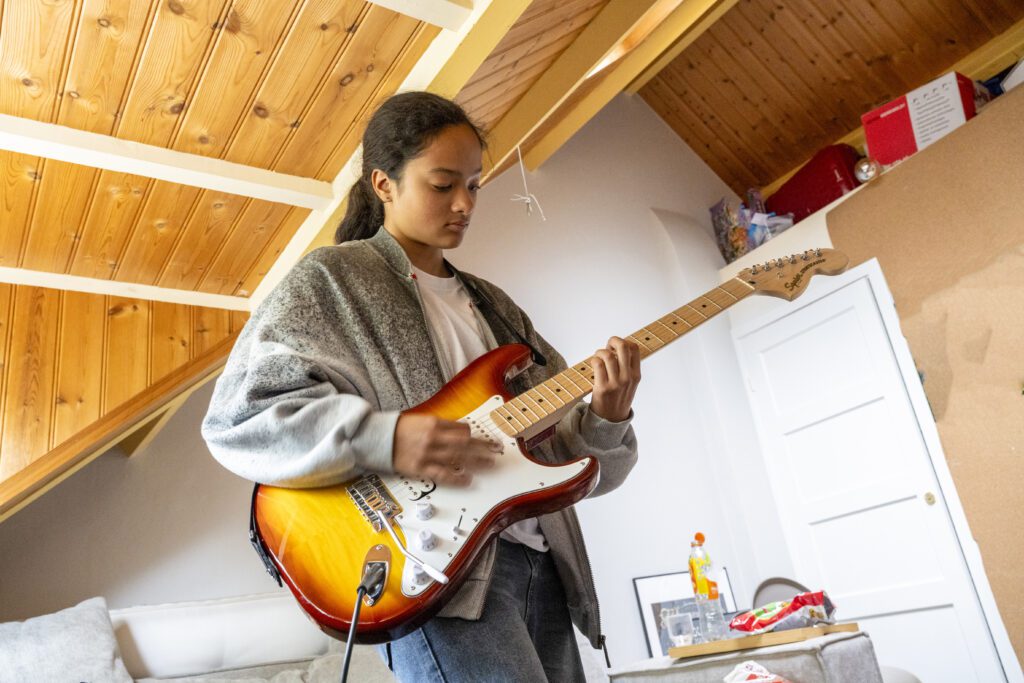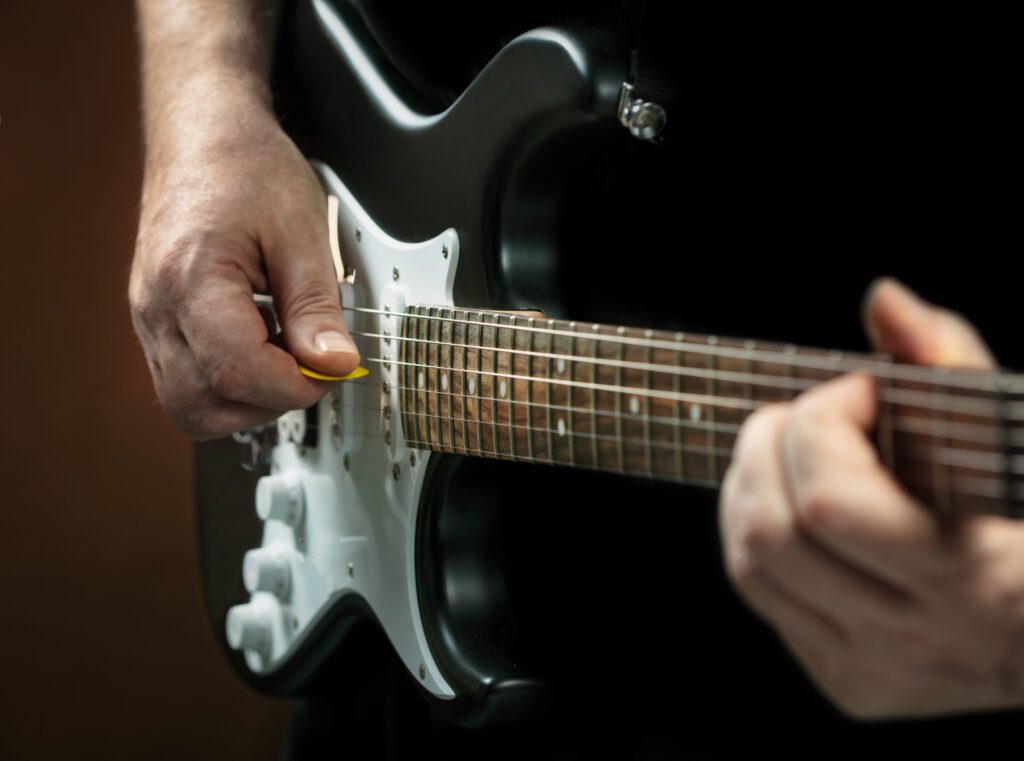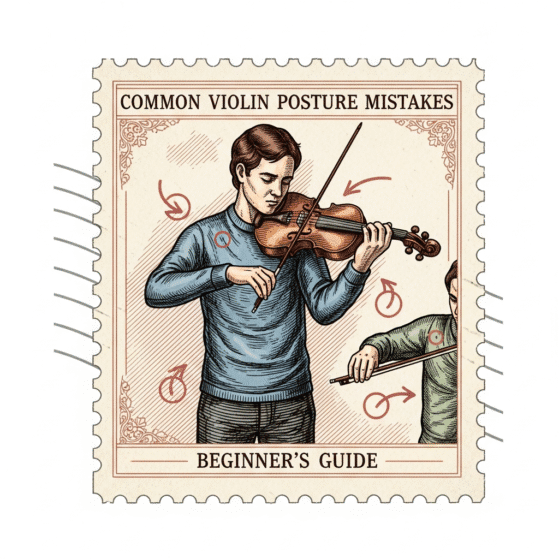How Long Does It Take to Master Electric Guitar?
The most common question that might arise in the minds of those starting their electric guitar is journey is – How long does it take to master electric guitar?
Mastering the electric guitar is a journey that can vary greatly from person to person. It’s influenced by your dedication, practice habits, and personal goals. While there’s no one-size-fits-all answer, understanding the stages of progress and the time it typically takes can help you gauge what to expect and how to achieve mastery.
Factors Influencing the Time to Master Electric Guitar

1. Practice Routine and Consistency
The amount of time you dedicate to practice is one of the biggest factors in how quickly you’ll master the electric guitar. Regular, focused practice sessions are key. Beginners who practice 30 minutes to an hour daily can expect to make significant progress faster than those who practice sporadically.
2. Quality of Instruction
Whether you’re self-taught or learning through a teacher, the quality of your instruction plays a big role. A structured learning path will help you build solid foundations, whereas unstructured practice can slow down progress. Consider enrolling in lessons, following structured online courses, or learning from a skilled instructor who can provide feedback.
3. Music Theory and Technique
Mastering electric guitar involves more than just learning how to play songs. It requires a deep understanding of music theory, scales, chords, and techniques such as fingerpicking, bending, and alternate picking. The more you invest in learning these skills, the quicker you’ll reach mastery.
4. Personal Goals and Musical Style
If your goal is to play a few of your favorite songs or jam with friends, you can achieve that within a few months. However, if you aspire to become a professional guitarist or play advanced genres like jazz or metal, it will take longer. The complexity of the music you want to play and your ultimate goals will shape the time needed to master the electric guitar.
Milestones on the Road to Mastery

Here’s a rough breakdown of the time it takes to reach various levels of proficiency on the electric guitar:
1. Beginner (0-6 months)
In the first few months, you’ll focus on the basics:
- Learning open chords and power chords
- Basic strumming and picking patterns
- Familiarizing yourself with the fretboard
- Playing simple songs and riffs
Most beginners can play easy songs and switch between basic chords within 3-6 months with consistent practice. However, mastery is still a long way off at this stage.
2. Intermediate (6 months – 2 years)
After about six months to a year, you’ll likely start to feel more comfortable with the instrument. By this stage, you’ll be able to:
- Play more advanced chords (e.g., barre chords)
- Understand scales and how to improvise
- Perform simple solos and riffs
- Play songs from start to finish
By the two-year mark, many guitarists have enough proficiency to join a band or perform live in casual settings. While this doesn’t mean you’ve “mastered” the electric guitar, you’ll be well on your way.
3. Advanced (2-5 years)
After two to five years of disciplined practice, you’ll begin to approach an advanced level of playing. At this point, you should be able to:
- Play complex solos and advanced techniques like sweep picking, legato, and tapping
- Improvise over different musical styles and keys
- Understand advanced music theory
- Perform with technical precision and fluency
Players at this level can perform professionally, whether in a band or as soloists. Mastering advanced guitar techniques can take years, and even then, the journey doesn’t stop.
4. Mastery (5-10+ years)
True mastery of the electric guitar often takes 5 to 10 years of dedicated practice. At this level, you should:
- Have complete control over the instrument
- Play effortlessly across multiple genres and styles
- Innovate and create original music with ease
- Understand the subtleties of tone, dynamics, and expression
Even the most accomplished guitarists continue learning throughout their lives. Mastery is less about a final destination and more about an ongoing process of improvement.
How to Speed Up the Process of Mastering Electric Guitar

1. Develop a Structured Practice Routine
Set aside dedicated time each day to practice, and focus on different aspects of your playing (chords, scales, theory, ear training, etc.). Consistency is key—daily practice, even for 30 minutes, is more effective than practicing once a week for hours.
2. Learn from the Best
Watch tutorials, take lessons from skilled guitarists, and follow the playing styles of legendary guitarists. Understanding how professionals approach the instrument will inspire and refine your own playing.
To learn Electric Guitar from world class teachers at The Mystic Keys, explore our Electric Guitar Lessons Online.
3. Set Specific Goals
Set measurable goals for your progress. Whether it’s mastering a particular technique or learning a challenging solo, working toward specific targets will give you direction and motivation.
4. Play With Others
Join a band, attend jam sessions, or collaborate with other musicians. Playing with others helps you learn faster and exposes you to new techniques, styles, and challenges.
Conclusion
Mastering the electric guitar is a lifelong pursuit, and the time it takes varies from person to person. While you can learn the basics in a few months and reach an advanced level within a few years, true mastery might take a decade or more of focused practice. However, the joy of playing and the milestones along the way make the journey well worth it.
If you’re serious about learning electric guitar, set realistic goals, stay consistent, and always be open to improving your skills. With passion and dedication, mastery will be within your reach.
more information and exciting resources about learning music, visit our website at The Mystic Keys. For more music content and exciting offers follow us on
Facebook, Instagram, YouTube, LinkedIn, Twitter, Pinterest, Reddit, Threads, and Quora.








